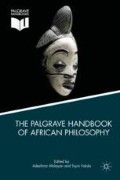Abstract
The motivation for a focus on indigenous (African) knowledge, science, and technology is fairly easy to explain, especially when one considers the denigration, suppression, and exploitation of traditional knowledge systems during and even after colonialism. Like “indigenous” or “African knowledge,” the emphasis on “indigenous science and technology” is a recent phenomenon. Horsthemke, in this chapter, addresses the question of whether the ideas of indigenous knowledge, science, and technology make any sense. A central problem Horsthemke engages is what appears to be the lack of clarity about the meaning or understanding of “knowledge.” As a challenge to IKS apologists, this chapter addresses the problem of relativism (about both knowledge and truth) and of the implications of taking epistemological relativism seriously. The chapter also interrogates the question of the basis, if there is one, for distinguishing between knowledge and superstition within indigenous African worldviews and belief systems.
Access this chapter
Tax calculation will be finalised at checkout
Purchases are for personal use only
References
Benson, O., and J. Stangroom. 2006. Why Truth Matters. London: Continuum.
Bernal, Martin. 2006. Africa in Europe/Egypt in Africa. Public Lecture, University of the Witwatersrand, South Africa, 7 June.
Grill, B. 2003. Ach, Afrika. Berichte aus dem Inneren eines Kontinents. Berlin: Siedler.
Hallen, Barry, and J.Olubi Sodipo. 1997. Knowledge, Belief, and Witchcraft: Analytical Experiments in African Philosophy, 2nd ed. Stanford, CA: Stanford University Press.
Hardwig, John. 1991. The Role of Trust in Knowledge. The Journal of Philosophy 88 (12): 693–709.
Horsthemke, Kai. 2004. Knowledge, Education and the Limits of Africanisation. Journal of Philosophy of Education 38 (4): 571–587.
Horsthemke, Kai. 2010. The Moral Status and Rights of Animals. Pinegowrie, South Africa: Porcupine Press.
Horsthemke, Kai, and M. Schäfer. 2007. Does ‘African’ Mathematics Facilitate Access to Mathematics? Towards an Ongoing Critical Analysis of Ethnomathematics in a South African Context. Pythagoras 65: 2–9.
Jegede, O.J. 1999. Science Education in Nonwestern Cultures: Towards a Theory of Collateral Learning. In What is Indigenous Knowledge? Voices from the Academy, ed. L.M. Semali, and J.L. Kincheloe, 119–142. New York, NY: Falmer Press.
Kaphagawani, D.N. 1998. Themes in a Chewa epistemology. In Philosophy from Africa, ed. P.H. Coetzee, and A.P.J. Roux, 240–244. Cape Town: Oxford University Press Southern Africa.
Le Grange, L. 2004a. ‘Multicultural’ Science in South Africa’s New National Curriculum Statement. Paper Prepared for the International Network of Philosophers of Education 9th Biennial Conference, Voices of philosophy of education, Madrid, Spain, 4–7 August.
Le Grange, L. 2004b. Western Science and Indigenous Knowledge. South African Journal of Higher Education 18 (3): 82–91.
Makgoba, M.W. 1997. Mokoko: The Makgoba Affair. A Reflection on Transformation. Florida: Vivlia.
Masolo, Dismas A. 2010. Self and Community in a Changing World. Bloomington: Indiana University Press.
Mqotsi, L. 2002. Science, Magic and Religion as Trajectories of the Psychology of Projection. In Indigenous Knowledge and the Integration of Knowledge Systems: Towards a Philosophy of Articulation, ed. C.A. Odora Hoppers, 158–172. Claremont: New Africa Books.
Odora Hoppers, C.A. 2002a. Introduction. In Indigenous Knowledge and the Integration of Knowledge Systems: Towards a Philosophy of Articulation, ed. C.A. Odora Hoppers, vii–xiv. Claremont: New Africa Books.
Odora Hoppers, C.A. 2002b. Indigenous Knowledge and the Integration of Knowledge Systems: Towards a Conceptual and Methodological Framework. In Indigenous Knowledge and the Integration Of Knowledge Systems: Towards a Philosophy of Articulation, ed. C.A. Odora Hoppers, 2–22. Claremont: New Africa Books.
Odora Hoppers, C.A. 2005. Culture, Indigenous Knowledge and Development: The Role of the University. Johannesburg: Centre for Education Policy Development (CEPD), Occasional Paper No. 5: 1–50.
Onwu, G., and M. Mosimege. 2004. Indigenous Knowledge Systems and Science and Technology Education: A Dialogue. African Journal of Research in SMT Education 8 (2): 1–12.
Rogers, A. 2007. The Making of Cosmic Africa: The Research Behind the Film. African Skies/Cieux Africains 11 (July): 19–23.
Seepe, S. 2000. Africanization of Knowledge: Exploring Mathematical and Scientific Knowledge Embedded in African Cultural Practices. In African voices in education, ed. P. Higgs, N.C.G. Vakalisa, T.V. Mda, and N.T. Assié-Lumumba, 118–138. Lansdowne: Juta.
Semali, L.M., and J.L. Kincheloe. 1999. Introduction: What is Indigenous Knowledge and Why Should We Study It? In What is Indigenous Knowledge?: Voices from the Academy, ed. L.M. Semali and J.L. Kincheloe, 3–57. New York, NY: Falmer Press.
Van Sertima, I. 1999. The Lost Sciences of Africa: An Overview. In African Renaissance-The New Struggle, ed. M.W. Makgoba, 305–330. Cape Town: Mafube Publishing.
Visvanathan, C.S. 2002. Between Pilgrimage and Citizenship: The Possibilities of Self-Restraint in Science. In Indigenous Knowledge and the Integration of Knowledge Systems: Towards a Philosophy of Articulation, ed. C.A. Odora Hoppers, 39–52. Claremont: New Africa Books.
Wiredu, Kwasi. 1980. Philosophy and an African Culture. Cambridge: Cambridge University Press.
Wiredu, Kwasi. 1998. The Concept of Truth in the African Language. In Philosophy from Africa, ed. P.H. Coetzee and A.P.J. Roux, 234–239. Cape Town: Oxford University Press Southern Africa.
Author information
Authors and Affiliations
Editor information
Editors and Affiliations
Copyright information
© 2017 The Author(s)
About this chapter
Cite this chapter
Horsthemke, K. (2017). Indigenous (African) Knowledge Systems, Science, and Technology. In: Afolayan, A., Falola, T. (eds) The Palgrave Handbook of African Philosophy. Palgrave Macmillan, New York. https://doi.org/10.1057/978-1-137-59291-0_38
Download citation
DOI: https://doi.org/10.1057/978-1-137-59291-0_38
Published:
Publisher Name: Palgrave Macmillan, New York
Print ISBN: 978-1-137-59290-3
Online ISBN: 978-1-137-59291-0
eBook Packages: Religion and PhilosophyPhilosophy and Religion (R0)

